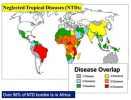By Mekonnen Teshome – Kampala, Ugannda – Scientists working for the Drugs for Neglected Diseases initiative (DNDi) say that they are conducting research and clinical trials to find safer, efficacious and more patient friendly treatment for various Neglected Tropical Diseases (NTD).
The statements came out in connection with the 11th DNDi Partners’ Meeting and the regional Scientific Journalistic Workshop being held in Munyonyo, Kampala, Uganda.
Neglected Diseases (NDs) are a group of tropical infections that are mostly common in low-income populations in developing regions of Africa, Asia,and the Americas. According to DNDi experts, Leishmaniasis, Filaria/ Onchocerciasis, Paediatric HIV and Human African Trypanosomiasisare among these neglected diseases that are caused by a variety of pathogens such as viruses, bacteria, protozoa and helminths.
Neglected Tropical Diseases should also be one of health priorities because over one billion people across the globe are affected. These people are generally the poorest of the poor and live remote rural area, urban slams or conflict zones.
DNDi Africa Regional Office Director Dr. Monique Wasunna says that with 30,000 to 40,000 new cases every year the Eastern African countries especially Eritrea, Ethiopia, Kenya, Somalia, South Sudan, Sudan and Uganda harbor world’s highest burden of Visceral Leishmaniasis (VL) or Kala Azar) worldwide which is the most deadly parasitic disease after malaria.
“Children are particularly vulnerable with the exception of North Ethiopia, where the disease affects mainly young male adults in work-related settings.” Visceral Leishmaniasis is caused by infection with Leishmania parasites, spread by the bite of infected female sand flies.
Due to this unmet medical needs,Dr. Monique says, a clinical research network, LEAP, has brought together experts from leishmaniasis endemic eastern African countries to facilitate clinical testing and improved access to better treatments for leishmaniasis in the region.
The expert added that there is an urgent need for new effective, safe, and convenient treatments as the existing medicines have variable efficacies, serious toxicities and only one is oral & rest are painful iv/im.
Similarly, Head of DNDi Filarial Disease Program, Dr.Sabine Specht indicated that as a huge unmet medical need to treat river blindness (onchocerciasis), DNDi has launched clinical trialstodeliver a short-course safe and efficacious macrofilaricidal drug for onchocerciasis.
Dr. Sabine said that her team is working to determine the maximum tolerated dose (MTD) of the new treatment targeting either directly on Onchocercoma containing male and female adult worms or on the cross-section of a female Onchocerca volvulus worm showing Wolbachia.
Although the clinical trials on the vector-born river blindness is bearing fruits, the elimination scenario seem to be difficult. The world would not be able to eradicate this disease, unless new treatments are developed, she says.
Head of DNDi Clinical Trial Section Dr. Nathalie Strub-Wourgaft says “Our general objective is providing solid efficacy evidence as well as identifying safety and tolerability signal. ”
Any general communication to patients needs to be authorised by Ethics Commitees first and must be controlled and need to be as transparent and understandable as possible, she added.
According to WHO, neglected tropical diseases are diverse group of communicable diseases that prevail in tropical and subtropical conditions in 149 countries. The diseases affect more than one billion people and cost developing economies billions of dollars every year. Populations living in poverty, without adequate sanitation and in close contact with infectious vectors and domestic animals and livestock are those worst affected.

